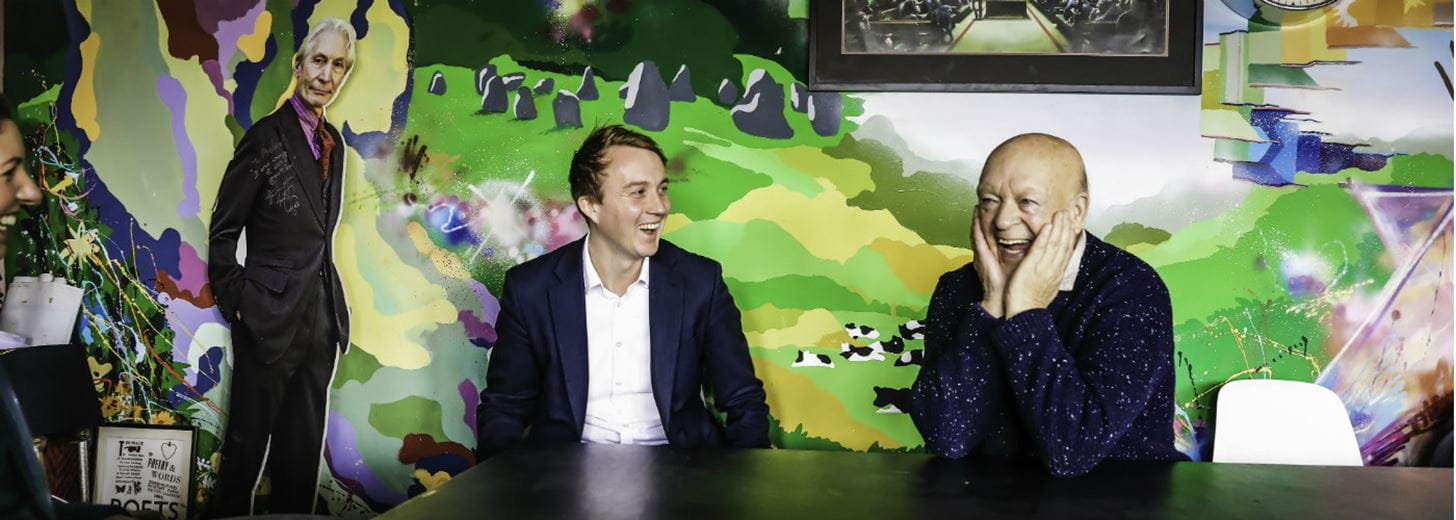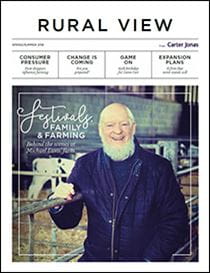The dairy farmer behind Glastonbury, one of the world’s biggest music festivals chats to his grandson Tim Brooksbank, Senior Surveyor in our Bath office, about how his life has taken many unexpected turns.
“There’s a crisis in my life every 15 minutes,” says Michael Eavis, the 82-year-old creator and founder of the famous Glastonbury festival, bursting with laughter. It echoes around his office at Worthy Farm; a building perched on top of a hill overlooking the skeleton of the world- renowned Pyramid Stage. It’s a chilly April morning, but Michael sits in his trademark shorts talking to Tim– one of his 19 grandchildren – listing the day’s jobs, some that will undoubtedly create further crises.
Amid all the glitz and glamour of putting on Glastonbury festival, it’s easy to forget that 1,000 dairy cows are the true heart of the site, “we have been farming here for 150 years and I want to keep that going,” says Michael, and despite being home to one of the world’s biggest music festivals, he believes “it would be a pretty boring farm without the cattle here!”
Michael was thrown in at the deep end when he was 19. His father died, and as the eldest of four children he was called back from the Merchant Navy to take control of the farm. “My mother thought I was the one who was most likely to make it work – she was good judge of character!” Another big laugh fills the room. With farming firmly running through his blood, Michael milked for 40 years non-stop following his father’s death, but confesses that running the festival now takes every ounce of his energy.
Two managers now oversee all dairy affairs, milking the Friesians twice daily to supply Medina Dairy, which bottles and sells fresh milk predominantly across south-east England.
It would be a pretty boring farm without the cattle here!
Michael knows the way his farm is set up doesn’t pay, but continues to see both the dairy farm and the festival as important parts of the bigger picture. “Of course the farm and I wouldn’t be here now without the festival, but farming is what I like doing and I’m incredibly fortunate to be able to keep going. If I can get 30p/litre for my milk then I think I’m in profit, but we have invested heavily in the dairy and farming is a lot more expensive now than it used to be.” Whilst the farm provides numerous employment opportunities, this don’t come without significant financial cost. “Maybe if you are on your own and have 100 cows like I once did, then you can do well with no staff costs”. Michael appreciates the role the festival plays in ensuring the farm is able to keep going, “I’m lucky to have the people I have and am able to pay them proper wages so that they stay here and I don’t have to give my whole life to the cows.”
Given the relatively privileged position Michael now finds his farm in, you would be forgiven for thinking that Brexit doesn’t come into his thinking. However, he worries for his fellow farmers and is “terrified of Brexit,” he said. “A lot of farms are going to struggle because I think there is going to be cheap food coming in, and I don’t think there will be enough support for British farming. It might not be as bad as I’m predicting, but I worry about the ordinary farms that don’t have a sideline.”
While Michael is not planning any significant changes to his farming business in light of Brexit, he is building an anaerobic digestion plant to supplement his solar panels and create more electricity for the site.
Just as the cows wouldn’t be here without the festival, the festival wouldn’t be here without the cows. When Michael and his second wife, Jean – Tim’s grandmother – decided to run their own festival for the first time in 1970 it was Michael’s milk cheque that paid the headline act. “I had the Kinks booked but they cancelled when they heard it wasn’t much of a do. They said they had laryngitis – all four of them,” he roared. “Marc Bolan from T-Rex was going to Butlins in Minehead and happened to be passing through, and I somehow got him to agree to play. We only had 500 people turn up so I couldn’t pay him, but he was absolutely brilliant. Instead I agreed to give him £100/month from my milk cheque.” Things are very different now, but Tim says his grandfather hasn’t changed much as a result of the festival’s success.
I worry about the ordinary farms that don’t have a sideline.
Few people have a better understanding of what Glastonbury festival means than Michael and his family, most of whom have direct involvement with it. An opportunity which arose through the festival, has helped shape the future of Tim’s parents wine business, which stemmed from growing grapes on the farm. Michael needed wine at the festival, and encouraged them to sell their wine at Glastonbury. “Since then we have been to events all over the country and they have expanded and now make over 100,000 litres of wine for vineyards across England” says Tim. Working within his parents’ business has also helped Tim’s own career here at Carter Jonas, handling negotiations, leases and sales of retail space, between tenants and landlords. “There are many examples of food and drink businesses that started at Glastonbury and now want to expand in to having permanent units in Bath and surrounding towns and cities,” he said. “I handle some of those accounts and try to apply what I learnt from working within my parents’ business when handling negotiations between landlords and potential tenants. What we want to see is an agreement that creates a successful retail unit.”
Being an incubator for successful businesses is something Michael is very proud of, and he sees the waves his 48-year-old festival makes in the surrounding countryside. “For Somerset, it brings in £100m. It’s a huge economic boost,” he said. “It creates a lot of employment within a 20-mile radius of this farm and I rely on these people to be able to do what I do.” About 100 permanent staff are employed on the farm, but that number swells to 30,000 when 175,000 music fans arrive and swarm the 1,200-acre site – 700 acres of which is rented from neighbouring farmers. In a fallow year, such as 2018, the site continued to be busy, but calm.
Looking to the future, Michael has no plans to retire any time soon, and the festival isn’t the only diversification project Michael is working on. He’s building 50 new houses for “ordinary, working, local people” to rent. Owned by the Guinness Trust, they are being built on farmland Michael has gifted with stone from his own quarry. “These houses are a big thing in my life, and I want to get them done,” he explained. It will be his permanent, visible legacy in the local, rural community and yet another example of how the success of the farm reverberates around Somerset.
Read more articles like this by downloading our Spring/Summer 2018 Rural View, or visit the Farms, Land and Estates pages of our website to find out more about our services.
The Rural View has a new and exciting look, however rest assured it still covers all the very latest ‘hot topics’ being discussed across the rural community, including how natural capital could play a part in the future of subsidy payments and how consumer trends are impacting on food production.
We interview well known dairy farmer and Glastonbury festival owner Michael Eavis, and hear about his passion for farming and the challenges of running the UK’s most famous music festival.
To read more articles like the one above, click the link below to download the full publication.
Latest news
- DEFRA has today opened the Improving Farm Productivity grant
- Carter Jonas Reports Half Year Results for 2020
- Carter Jonas Strengthens Rural South West Team With Senior Appointment
- Battery Energy Storage
- Carter Jonas signs-up to Time to Change initiative
- Raft of Promotions at Carter Jonas
- Carter Jonas Achieves Gold Investors In People Accreditation
- Newbury Straw Sale met with Selective Trade as Spring Approaches
- Newbury Straw Sale met with buoyant trade






